302 scholarly books by University College London and 11
have author last names that start with F
302 scholarly books by University College London and 11
302 scholarly books by University College London
11 have author last names that start with F have author last names that start with F
11 have author last names that start with F have author last names that start with F
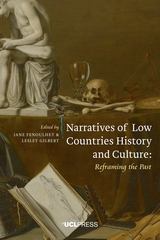
Narratives of Low Countries History and Culture
Reframing the Past
Jane Fenoulhet
University College London, 2016
This edited collection explores the ways in which our understanding of the past in Dutch history and culture can be rethought to consider not only how it forms part of the present but how it can relate also to the future. Divided into three parts – The Uses of Myth and History, The Past as Illumination of Cultural Context, and Historiography in Focus – this book seeks to demonstrate the importance of the past by investigating the transmission of culture and its transformations. It reflects on the history of historiography and looks critically at the products of the historiographic process, such as Dutch and Afrikaans literary history. The chapters cover a range of disciplines and approaches: some authors offer a broad view of a particular period, such as Jonathan Israel's contribution on myth and history in the ideological politics of the Dutch Golden Age, while others zoom in on specific genres, texts or historical moments, such as Benjamin Schmidt’s study of the doolhof, a word that today means ‘labyrinth’ but once described a 17th-century educational amusement park. This volume, enlightening and home to multiple paths of enquiry leading in different directions, is an excellent example of what a past-present doolhof might look like.
[more]
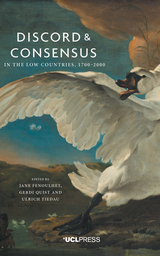
Discord and Consensus in the Low Countries, 1700-2000
Jane Fenoulhet
University College London, 2016
All countries, regions and institutions are ultimately built on a degree of consensus, on a collective commitment to a concept, belief or value system. This consensus is continuously rephrased and reinvented through a narrative of cohesion and challenged by expressions of discontent and discord. The history of the Low Countries is characterised by both a striving for consensus and eruptions of discord, both internally and from external challenges. This interdisciplinary volume explores consensus and discord in a Low Countries context along broad cultural, linguistic and historical lines. Disciplines represented include early-modern and contemporary history; art history; film; literature; and translation scholars from both the Low Countries and beyond.
[more]
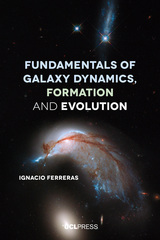
Fundamentals of Galaxy Dynamics, Formation and Evolution
Ignacio Ferreras
University College London, 2019
Galaxies, along with their underlying dark matter halos, constitute the building blocks of the universe. Of all the fundamental forces, gravity is the dominant one that drives the evolution of structures from small density seeds to the galaxies we see today. The interactions among myriads of stars, or dark matter particles, in a gravity-based structure produce a system with fascinating implications for thermodynamics, including both similarities and fundamental differences. Ignacio Ferreras presents a concise introduction to extragalactic astrophysics, with an emphasis on stellar dynamics and the growth of density fluctuations in an expanding universe. Additional chapters are devoted to smaller systems (stellar clusters) and larger ones (galaxy clusters). Written for advanced undergraduates and beginning postgraduate students, Fundamentals of Galaxy Dynamics provides a useful tool to embark on a research career. Some of the derivations for the most important results are presented in detail to enable students to appreciate the beauty of math as a tool to understand the workings of galaxies. Each chapter includes a set of problems to help students advance with the material.
[more]
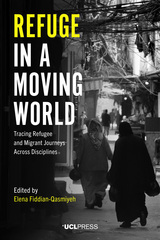
Refuge in a Moving World
Tracing Refugee and Migrant Journeys Across Disciplines
Elena Fiddian-Qasmiyeh
University College London, 2020
The journeys and experiences of refugees and migrants are deeply complex and highly varied. It takes critical reflections from a diverse range of fields and angles to communicate the nuanced tangles of power structures and inequalities on local, national, and international levels. Bringing (?) together over thirty contributions, Refuge in a Moving World discusses migration and displacement from a kaleidoscopic collection of voices.
Through interdisciplinary lenses, the contributors explore the ways that different people experience and respond to their own situations and to those of other people. Refuge in a Moving World combines vital reflections on the intricacies of conceptualizing experiences of forced migration and how people inhabit and negotiate everyday life. Ultimately, Refuge in a Moving World argues that working collaboratively to share experiences of migration and displacement fosters more sustainable responses to our moving world.
Through interdisciplinary lenses, the contributors explore the ways that different people experience and respond to their own situations and to those of other people. Refuge in a Moving World combines vital reflections on the intricacies of conceptualizing experiences of forced migration and how people inhabit and negotiate everyday life. Ultimately, Refuge in a Moving World argues that working collaboratively to share experiences of migration and displacement fosters more sustainable responses to our moving world.
[more]
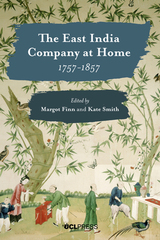
East India Company at Home, 1757-1857
Margot Finn
University College London, 2018
In the century between 1757 and 1857, The East India Company brought both sizeable affluence and fresh perspective back home to Britain from the Indian subcontinent. During this period, the Company shifted its activities and increasingly employed civil servants, army officers, surveyors, and doctors, many of whom returned to Britain with newly acquired wealth, tastes, and identities. This new volume moves beyond conventional academic narratives by drawing on wider research, exploring how the empire in Asia shaped British country houses, thus contributing to the ongoing conversation on imperial culture and its British legacies.
[more]
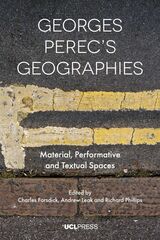
Georges Perec's Geographies
Material, Performative and Textual Spaces
Charles Forsdick
University College London, 2019
Georges Perec (1936–82) was one of the most inventive and original writers of the twentieth century. A fascinating aspect of his work as a novelist, filmmaker, and essayist is its intrinsically geographical nature. With many major projects on space and place, Perec’s writing speaks to a variety of geographical, urban, and architectural concerns—both in a substantive way, including a focus on cities, streets, and homes, and in a methodological way, as in his experiments with urban observation and exploration.
Georges Perec’s Geographies explores Perec’s geographical interests. The book is divided into two parts: Part I, “Perec’s Geographies,” explores space and place within Perec’s films, radio plays, and literature, from descriptions of actual streets to the fictional places within his work. Part II, “Perecquian Geographies,” explores geography in works directly inspired by Perec, including writing, photographs and photo essays, soundscapes, theater, and dance. Extending Perecquian criticism beyond literary and French studies to disciplines including geography, urban studies, and architecture, Georges Perec’s Geographies offers a complete and systematic examination that will be of interest not only to Perec scholars but also to students and researchers across these subjects.
Georges Perec’s Geographies explores Perec’s geographical interests. The book is divided into two parts: Part I, “Perec’s Geographies,” explores space and place within Perec’s films, radio plays, and literature, from descriptions of actual streets to the fictional places within his work. Part II, “Perecquian Geographies,” explores geography in works directly inspired by Perec, including writing, photographs and photo essays, soundscapes, theater, and dance. Extending Perecquian criticism beyond literary and French studies to disciplines including geography, urban studies, and architecture, Georges Perec’s Geographies offers a complete and systematic examination that will be of interest not only to Perec scholars but also to students and researchers across these subjects.
[more]
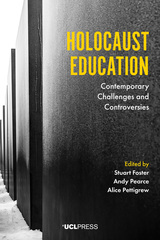
Holocaust Education
Contemporary Challenges and Controversies
Stuart Foster
University College London, 2020
How do you teach children about the horrifying and systematic violence of the Holocaust? Especially when the very thing that makes it challenging—its intense and complex cruelty—also makes it so necessary to be taught?
Teaching and learning about the Holocaust is central to school curriculums across the globe. But the history of the Holocaust remains controversial and can render teaching it daunting, even to the most experienced instructors. Drawing on landmark research into teaching practices and students’ knowledge, Holocaust Education provides unique insights about classroom learning. It sheds light on key challenges in Holocaust education, including the impact of misconceptions and misinformation, the dilemma posed by images of atrocity, and how to approach teaching in ethnically diverse environments. Overviews of the most significant debates in Holocaust education provide wider context for the classroom evidence. Holocaust Education offers a vital guide, leading readers through some of the most vexed areas of Holocaust challenges and controversies for teachers, researchers, and policymakers.
Teaching and learning about the Holocaust is central to school curriculums across the globe. But the history of the Holocaust remains controversial and can render teaching it daunting, even to the most experienced instructors. Drawing on landmark research into teaching practices and students’ knowledge, Holocaust Education provides unique insights about classroom learning. It sheds light on key challenges in Holocaust education, including the impact of misconceptions and misinformation, the dilemma posed by images of atrocity, and how to approach teaching in ethnically diverse environments. Overviews of the most significant debates in Holocaust education provide wider context for the classroom evidence. Holocaust Education offers a vital guide, leading readers through some of the most vexed areas of Holocaust challenges and controversies for teachers, researchers, and policymakers.
[more]
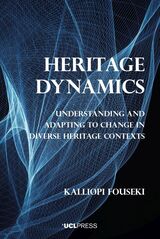
Heritage Dynamics
Understanding and Adapting to Change in Diverse Heritage Contexts
Kalliopi Fouseki
University College London, 2022
A systemic reconsideration of the formation and preservation of heritage.
As a sociocultural concept, heritage flows through cycles of emergence, change, disappearance, and revival. These lifecycles are influenced by heritage environments such as museums, landscapes, cities, and intangible networks of cultural circulation. In Heritage Dynamics, Kalliopi Fouseki develops a new theoretical and methodological framework that will enable heritage scholars and practitioners to unpack the ways and conditions under which heritage changes. Under the contexts of urban cities, residential buildings, museum collections, and subjects of intangible heritage especially concerning flamenco, this work re-orients the consideration of heritage as an object, process, or discourse, towards a more systemic thinking that captures the complexity of this historical-cultural force.
As a sociocultural concept, heritage flows through cycles of emergence, change, disappearance, and revival. These lifecycles are influenced by heritage environments such as museums, landscapes, cities, and intangible networks of cultural circulation. In Heritage Dynamics, Kalliopi Fouseki develops a new theoretical and methodological framework that will enable heritage scholars and practitioners to unpack the ways and conditions under which heritage changes. Under the contexts of urban cities, residential buildings, museum collections, and subjects of intangible heritage especially concerning flamenco, this work re-orients the consideration of heritage as an object, process, or discourse, towards a more systemic thinking that captures the complexity of this historical-cultural force.
[more]
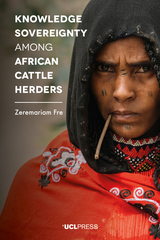
Knowledge Sovereignty Among African Cattle Herders
Zeremariam Fre
University College London, 2018
Beni-Amer cattle owners in the western part of the Horn of Africa are not only masters in cattle breeding, they are also knowledge sovereign, in terms of owning productive genes of cattle and the cognitive knowledge base crucial to sustainable development. The strong bonds between the Beni-Amer, their animals, and their environment constitute the basis of their ways of knowing, and much of their knowledge system is built on experience and embedded in their cultural practices.
In this book, the first to study Beni-Amer practices, Zeremariam Fre argues for the importance of their knowledge, challenging the preconceptions that regard it as untrustworthy when compared to scientific knowledge from more developed regions. Empirical evidence suggests that there is much one could learn from the other, since elements of pastoralist technology, such as those related to animal production and husbandry, make a direct contribution to our knowledge of livestock production. It is this potential for hybridization, as well as the resilience of the herders, at the core of the indigenous knowledge system.
Fre also argues that indigenous knowledge can be viewed as a stand-alone science, and that a community’s rights over ownership should be defended by government officials, development planners and policy makers, making the case for a celebration of the knowledge sovereignty of pastoralist communities
In this book, the first to study Beni-Amer practices, Zeremariam Fre argues for the importance of their knowledge, challenging the preconceptions that regard it as untrustworthy when compared to scientific knowledge from more developed regions. Empirical evidence suggests that there is much one could learn from the other, since elements of pastoralist technology, such as those related to animal production and husbandry, make a direct contribution to our knowledge of livestock production. It is this potential for hybridization, as well as the resilience of the herders, at the core of the indigenous knowledge system.
Fre also argues that indigenous knowledge can be viewed as a stand-alone science, and that a community’s rights over ownership should be defended by government officials, development planners and policy makers, making the case for a celebration of the knowledge sovereignty of pastoralist communities
[more]
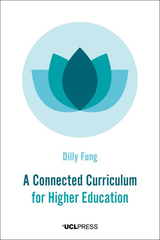
A Connected Curriculum for Higher Education
Dilly Fung
University College London, 2017
Is it possible to bring university research and student education into more symbiotic relationships? Can we grow programs of study enabling faculty, students, and “real world” communities to connect in new ways? These are some of the central questions Dilly Fung gauges in this accessible new book. Fung also looks to philosophy to help engender spaces for critical dialogue about educational values within teaching departments, research groups, and larger educational communities. Ultimately, Fung argues, these connections are not only possible but also potentially transformational for efforts to contribute to the global common good.
[more]
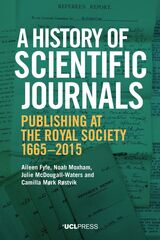
A History of Scientific Journals
Publishing at the Royal Society, 1665–2015
Aileen Fyfe
University College London, 2022
A comprehensive history of scientific publishing and its impact on scientific discourse.
Modern scientific research has changed significantly since the days of Isaac Newton, with professionalized, collaborative, and international networks that engage a more diverse community of researchers. Yet, the long history of scientific publishing reveals a deep mutual relationship between how academic discourse develops and what (and how) research is published. With unique insights from the Royal Society of London’s comprehensive archives spanning 350 years of scientific journal publishing, A History of Scientific Journals illustrates the entangled histories of scientific publishing and professional discourses. This volume provides insights into the editorial management, business practices, and financial difficulties of journals such as Philosophical Transactions, which was first published in 1665 and has published papers by Newton, Darwin, Dorothy Hodgkin, and Stephen Hawking. Highly illustrated with photographs of historic archived documents, including early publications and editorial annotations, this history extends to the present day and includes a look at digital journal publication and the open-access movement, making the book's publication through UCL Press both appropriate and symbiotic.
Modern scientific research has changed significantly since the days of Isaac Newton, with professionalized, collaborative, and international networks that engage a more diverse community of researchers. Yet, the long history of scientific publishing reveals a deep mutual relationship between how academic discourse develops and what (and how) research is published. With unique insights from the Royal Society of London’s comprehensive archives spanning 350 years of scientific journal publishing, A History of Scientific Journals illustrates the entangled histories of scientific publishing and professional discourses. This volume provides insights into the editorial management, business practices, and financial difficulties of journals such as Philosophical Transactions, which was first published in 1665 and has published papers by Newton, Darwin, Dorothy Hodgkin, and Stephen Hawking. Highly illustrated with photographs of historic archived documents, including early publications and editorial annotations, this history extends to the present day and includes a look at digital journal publication and the open-access movement, making the book's publication through UCL Press both appropriate and symbiotic.
[more]
READERS
Browse our collection.
PUBLISHERS
See BiblioVault's publisher services.
STUDENT SERVICES
Files for college accessibility offices.
UChicago Accessibility Resources
home | accessibility | search | about | contact us
BiblioVault ® 2001 - 2024
The University of Chicago Press









